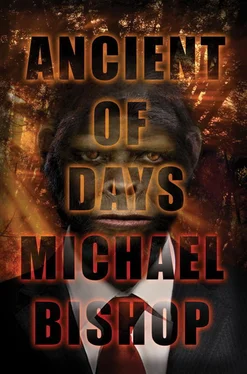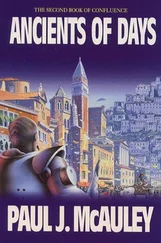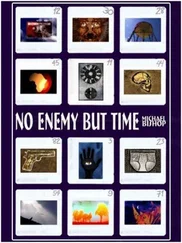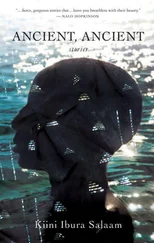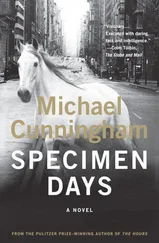“That doesn’t sound like him. It’s self-pitying.”
“It is and it isn’t. I think he was expressing a degree of concern about the people around him. It bothers him that so many people—RuthClaire, me, Bilker, the cops and special agents, and you too, probably—are endangering themselves trying to help him. He feels responsible.”
“Well, he could just as easily say, ‘I’m a lightning rod for human charity.’ He’s looking at things backwards, Paul.”
“Is he any different from the rest of us? He takes the good for granted. Evil thoroughly confounds him.”
Caroline said, “ Oh! ” as if a 100-watt bulb had gone on over her head.
“What is it?” I asked her.
“Do you recall how Adam may’ve got to the States? How he was one of three habiline crew members on a fishing boat running guns from Punta Gorda in Cuba to the guerrilla opposition to Baby Doc in Haiti? Only that boat never made it back to Haiti. The Cuban I interviewed in the Atlanta Pen—Ignacio Guzman Suarez y Peña—well, Ignacio murdered the captain of that vessel and two of Adam’s fellow habilines. That’s another instance of violence that haunts Adam, another reason he keeps seeing himself as a ‘lightning rod for human cruelty.’ We keep forgetting he has a past antedating his first appearance in Georgia.”
I started to object, but Caroline cut me off:
“RuthClaire does, of course, but the rest of us have no strong sense of the hardships he’s already survived.”
“I love you, kid,” I said. Only the faint idiot singing of the wires—the roaring of the voiceless inane—still linked us. I shifted on the sagging cot, sweat lubricating my flanks. “You still there, Caroline?”
“You might have had the decency to tell me that last Saturday morning.”
“What’s wrong? Everything was okay yesterday, wasn’t it? Between us, I mean.”
She let the wires sing a few seconds. “Paul, I got a letter from Brian today.”
“Nollinger?” My heart sank.
The very one, she admitted. The letter had come from a city called Montecristi in a northeastern province of the Dominican Republic. In it, good old Brian spent several paragraphs justifying his abrupt departure from Atlanta. His position in the anthropology department at Emory had steadily deteriorated. His well-publicized quarrel with the Zarakali paleoanthropologist Alistair P. Blair had put him on mushy ground with his colleagues, most of whom revered the cantankerous old fart. Nor had Brian improved their opinion of him by accusing the artist RuthClaire Loyd of making Adam Montaraz, the habiline refugee from the Caribbean, her personal “slave,” when, in fact, the two had freely married each other. Unleashing an agent of the INS on Adam had been yet another regrettable mistake.
“He made plenty of ’em. Glad to know he’s begun to regret them.” Caroline shushed me. Gradually among Brian’s colleagues, she continued, paraphrasing the letter, there had grown a perception that he was trying to milk the habiline controversy of every last drop of career benefit. (And ineptly missing the pail.) He had further compounded his problems in the department by belatedly developing scruples about some experiments, with primates, at the field station north of Atlanta. Did these experiments serve any essential research purpose, or were they only a convenient means of generating grant money for ethologists who might otherwise lack employment? At last, chagrined by his own complicity in this system, he had made loud noises about the inhumanity of his long study with stub-tailed macaques. Never again would he exploit innocent primates for research purposes, no matter how noble the cause. Colleagues with funded experiments of their own had interpreted Brian’s newfound scrupulosity as a holier-than-thou slap in the face. His reputation as a limelight-seeking cad had grown into a behemoth.
“He deserved that reputation.”
“Maybe. He says that since last summer he’s been a waking nightmare. He says if it hadn’t been for my affection and support, he would’ve overdosed on sleeping tablets by Christmas.”
“That’s touching. Considering the debt he feels he owed you, why do you suppose he never bothered to tell you goodbye?”
“He apologizes for that. He feared if he came to say goodbye, he’d chicken out and stay. When he learned he’d landed a research position with an American concern in the Dominican Republic, he didn’t know whether to cheer or what. It was such a drastic break with his own past: a Georgia boy with advanced degrees in anthropology and primate behavior. He turned his back on all that. He didn’t know if he could do it, Paul.”
“It looks like he managed.”
“Relax, will you? I’m not buying an airline ticket to the Dominican. I don’t love Brian. I’m just relieved to know he’s okay.”
I did relax. She no longer loved the man. Why, then, had she been so tentative about telling me he’d written? Well, my attitude toward him precluded comfortable talk about her former lover. She’d been afraid to mention Brian’s name, much less tell me about his letter. Also, she’d felt that to hold back word of the letter would be to sabotage whatever degree of trust we had so far created between us.
“What the hell’s he doing down there, anyway?” I blurted.
“He’s a sugar-industry hire.” I heard Caroline shuffling the pages of Brian’s letter as I’d once heard Puddicombe uncreasing his list of ransom demands. “The plantations on which he’s to work are owned by the Austin-Antilles Corporation. They’ve asked him to look into the conditions of Haitian canecutters. The canecutters are hired on a lottery basis by the local sugar-harvesting network. Brian’s supposed to propose cost-efficient ways of improving their lot—without destroying the economic base of the Haitian or the Dominican government.”
“Cripes. “
“What? Brian says he’s already begun spotlighting the squalid conditions of the canecutters. He’s excited. He thinks finding a way to channel some of Austin-Antilles Corporation’s money to these folks will be a challenge. He’s using his anthropological background for a humane sociological purpose.”
“Caroline, it’s a shortcut to crucifixion.”
“Why?”
“Don’t kid me. You’re the one who’s worked with Cuban and Haitian refugees.”
“Not down there. Only here. What’re you getting at?”
“Haitian politics are nasty. Dominican democracy is fragile, and Austin-Antilles is a multinational conglomerate that’s never shared the wealth with peons. The reverse, in fact. From what little I know, it sounds to me as if your friend Brian is getting caught in the middle of a canecutting public-relations ploy. Haitian workers always get the shitty end of the stick.”
“Brian thinks he may be able to do some good.”
“Let’s hope he doesn’t end up with nails in his feet and palms.”
Caroline chuckled mordantly. “That’s the first time you’ve wished him anything less fatal than hanging at dawn, isn’t it?”
Probably, I admitted. I also told Caroline that if Brian did his job too well, and if Austin-Antilles did not fire him for his presumption, he’d surely be transferred to a less controversial company enterprise elsewhere. That was how the Big AAC did business.
For a moment, inarticulate arias of static. Then my caller said, “I love you, too,” and hung up. I sat there in the heat, stunned, savoring her words.
At Paradise Farm, Adam was vegetating. If he wrote RuthClaire a letter, he forgot to give it to me to mail. If he started a crossword puzzle, he soon lost interest. His books on theology, religious history, the philosophy of religion, and contemporary creation theory sat untouched in their boxes in the second-floor studio. Neil Hammond did not come by with news, and on Sunday morning, too wrought up by Caroline’s declaration of love to sleep late, I was the one who turned on Great Gospel Giveaway .
Читать дальше
